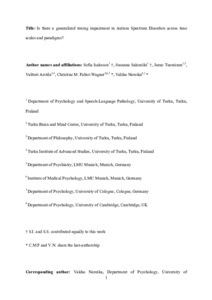Is there a generalized timing impairment in Autism Spectrum Disorders across time scales and paradigms?
Christine M. Falter-Wagner; Sofia Isaksson; Susanna Salomäki; Jarno Tuominen; Valtteri Arstila; Valdas Noreika
https://urn.fi/URN:NBN:fi-fe2021042713230
Tiivistelmä
Individuals with ASD have abnormal motor and perceptual functions that
do not currently form diagnostic criteria of ASD, but nevertheless may
affect everyday behaviour. Temporal processing seems to be one of such
non-diagnostic yet impaired domains, although the lack of systematic
studies testing different aspects of timing in the same sample of
participants prevents a conclusive assessment of whether there is a
generalized temporal deficit in ASD associated with diagnostic symptoms.
17 children diagnosed with ASD and 18 typically developing age- and
IQ-matched controls carried out a set of motor and perceptual timing
tasks: free tapping, simultaneity judgment, auditory duration
discrimination, and verbal duration estimation. Parents of participants
filled in a questionnaire assessing the sense and management of time.
Children with ASD showed faster and more variable free tapping than
controls. Auditory duration discrimination thresholds were higher in the
ASD group than controls in a sub-second version of the task, while
there were no group differences in a supra-second discrimination of
intervals. Children with ASD showed more variable thresholds of
simultaneity judgment, and they received lower parental scores for their
sense and management of time. No group differences were observed in the
verbal duration estimation task in the minute-range. Different timing
functions were correlated in the ASD group but not among controls,
whilst several timing measures correlated with ASD symptoms. We conclude
that children with ASD show a broad range of abnormalities in temporal
processing tasks including motor timing, perceptual timing, and temporal
perspective.
Kokoelmat
- Rinnakkaistallenteet [19207]
